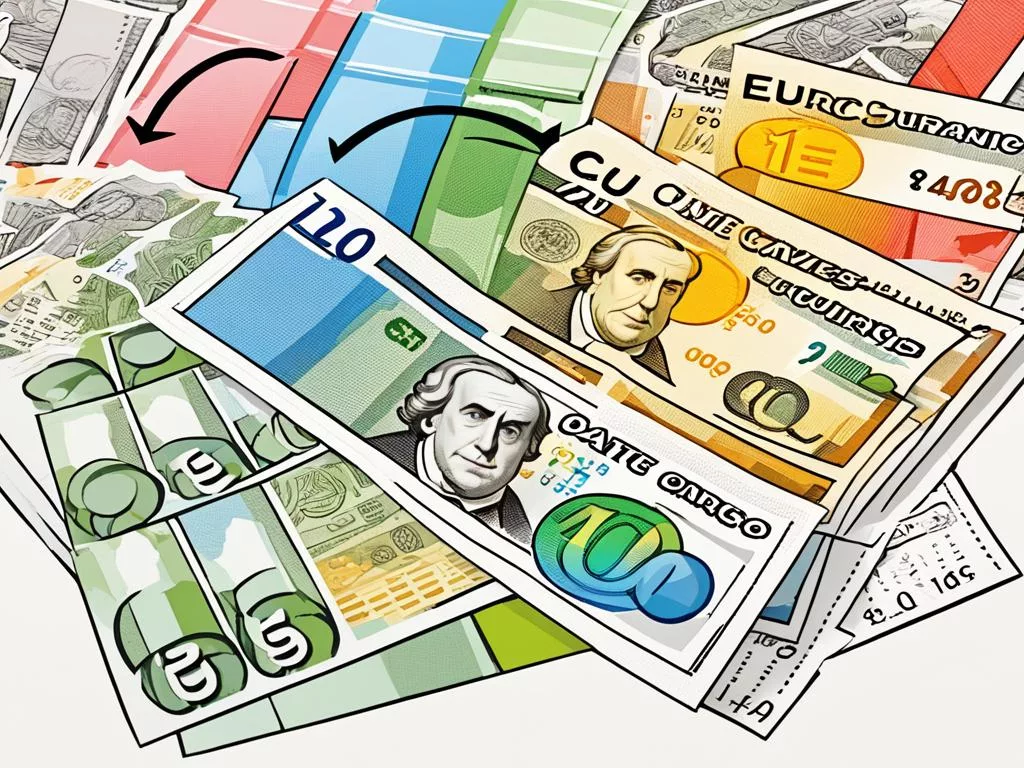When you travel, knowing whether to use euros or pounds is key. This guide draws from my travels across Europe. We look at currency through real-world views and data. The main currency for tax is often the U.S. dollar, but there are exceptions. It’s crucial to check exchange rates against reliable sources when converting money for taxes1.
About 90% of credit cards add a fee for foreign purchases, increasing your cost by up to 3%2. The choice between euros and pounds gets harder with dynamic currency conversion fees. These fees can add about 5% to your costs when paying in dollars abroad2. To avoid hidden charges, it’s smarter to pay in the local currency.
In summary, deciding to pay in euros, pounds, or local currency can save you money. Choosing the right payment method affects how much you spend. Always use local currencies when possible and watch the exchange rates12.
Understanding Dynamic Currency Conversion and Its Costs
When I’m abroad, I often run into Dynamic Currency Conversion (DCC) at shops and restaurants. DCC changes the price of what I buy into my home currency right away, but it might cost more due to extra fees and not-so-great exchange rates3. I know that usual fees for changing currency are about 1%, but with DCC, there might be more added on3. This is because the DCC rates are decided by the provider, not the actual market rate3.
DCC might seem good at first because it shows the price in my currency when I buy something. But, I’ve found that the exchange rates are often worse than what my credit card gives in the local currency3. Visa and Mastercard usually have better rates, saving me money if I choose to pay in the local money3. That’s why I always say no to DCC offers3.
Even with DCC, credit card companies might charge extra fees for foreign transactions. I’ve looked into cards without these extra fees to save money3. For example, some companies charge a 3% fee, while Amex charges 2.7%. But Capital One charges no fee at all4.
In my research, I’ve found that credit card companies charge about 1% for changing currency, and their own fees are around 2%4. DCC fees by merchants can be really high, sometimes up to 18%4. Paying in local currency helps me avoid these high DCC fees and other charges4.
With the euro equal to the U.S. dollar recently, I pay more attention to exchange rates5. The euro has dropped by 11% since the year started. This change affects how much I spend when I’m in Europe5. It’s also why more Americans might be traveling to Europe now, looking for smart ways to handle money exchange5.
Based on good foreign exchange tips, I keep my purchases in local currency and use cards without foreign transaction fees. I also avoid DCC to get the best exchange rates. This has not only saved me money but made shopping abroad clearer and less stressful.

The Essential Guide to Using ATMs Abroad
Using ATMs abroad is smart when needing local money while traveling. They offer better rates than airport exchanges6. You can take out just what you need, which reduces leftover cash6. In Europe, many ATMs don’t charge fees1, but it’s wise to check as fees can vary between banks6.
Knowing the best currency to use is key when overseas. It’s important to check the ATM’s rate against trusted sources like the Treasury Department1. For U.S. taxpayers, remember to report to the IRS using the bank’s exchange rate on the day of the transaction1.
- Inform your bank before traveling abroad to use ATMs smoothly6.
- Coins, like 2 Euros or Pounds, are valuable. Spend them before leaving as you can’t exchange coins back home6.
- To cut down fees, think about opening a bank account locally if you’re staying long6.
Credit cards with no foreign transaction fees are great abroad6. Using apps to monitor spending helps prevent fraud and avoid interest6.
Doing a bit of research is beneficial. Sites like Oanda.com, xe.com, or x-rates.com provide helpful exchange rate info1. This knowledge ensures you’re getting a good deal.
Combining cash and credit wisely helps avoid financial stress during travel. Keep these tips in mind for a rewarding and budget-friendly journey.
Guide to should i pay in euros or pounds
When traveling abroad, learning about international payment options is crucial. It helps avoid high fees. My main rule is to always pay in the local currency. This way, I get the best deals and dodge extra charges from Dynamic Currency Conversion (DCC). Astonishingly, about 90% of credit cards add foreign transaction fees, sometimes adding 3% more2. By paying in the local currency, I avoid these extra costs.
In countries outside the eurozone, this advice matters even more. Sometimes euros or pounds are accepted, especially in tourist spots, but this comes with extra fees. Not being aware of DCC and its fees could mean losing $150 on a $1,500 expense2. And if my credit card doesn’t charge foreign transaction fees, I might still face DCC fees, costing an extra 5% to see the bill in U.S. dollars2. Paying in euros or pounds in non-eurozone countries can also result in paying more because of bad exchange rates2.
Choosing the local currency at checkout is the smartest move2. It’s more than just foreign exchange advice; it’s a crucial way to stretch my travel dollars. Whether I’m eating out, buying gifts, or planning activities, using local currency saves me from hidden fees and bad exchange rates. It’s a smart habit that fits the idea of paying in local currency. I stick to this simple but powerful rule during all my travels.
Source Links
- https://www.irs.gov/individuals/international-taxpayers/foreign-currency-and-currency-exchange-rates
- https://www.latimes.com/travel/deals/la-tr-spot-20141116-story.html
- https://www.forbes.com/advisor/credit-cards/dynamic-currency-conversion/
- https://time.com/personal-finance/article/foreign-transaction-fees/
- https://www.cnbc.com/2022/07/12/euro-and-us-dollar-near-parity-heres-what-that-means-for-travelers.html
- https://www.studyabroad.iastate.edu/preparing/handbook/money

